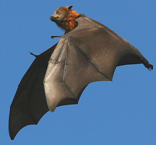
Amid a deadly outbreak of the bat-borne Nipah virus in India that has already killed 10 people, the Coalition for Epidemic Preparedness Innovations (CEPI) said on Thursday it will provide up to $25 million to Profectus BioSciences Inc. and Emergent BioSolutions Inc. for the development and manufacture of a Nipah virus vaccine.
Closely related to Hendra virus, Nipah virus causes respiratory and encephalitis disease in human and animal hosts. Intensive supportive care is currently the only treatment option, and Nipah virus has a mortality rate of about 75 percent.
CEPI will provide Profectus with development funding for the vaccine over a five-year period, and Emergent will provide technical and manufacturing support for the program. Emergent also will retain an exclusive option on licensing and development activities for the Nipah virus vaccine.
“The current outbreak of Nipah in India, the government of which is one of CEPI’s founders, demonstrates that this is a deadly pathogen that has already travelled thousands of kilometers, has serious epidemic potential and the ability to surprise us,” CEPI CEO Dr. Richard Hatchett said. He added that the funding agreement between Profectus, Emergent and international nonprofit PATH represents “a vital move forward in the global battle against this devastating disease.”
The virus was identified before an outbreak in Malaysia killed 105 people and led to the slaughter of 1 million pigs to prevent the spread of the virus in 1999. Since then, outbreaks have been reported in Bangladesh and India, where the virus has been transmitted to humans through bat urine and saliva on fruit, or from livestock that was previously infected.
“Nipah’s human-to-human transmission has been documented, and any initially small outbreak could take the same course as the recent Ebola outbreak,” Profectus Chairman and CEO Thomas Lynch said. “With CEPI’s support and the talents of these highly regarded global health innovation partners, we look forward to applying our expertise and technologies and leveraging our partnership with Emergent to rapidly advance our pre-IND vaccine candidate for Nipah virus as an effective countermeasure that will be positioned to save patients around the world from this devastating disease,” Lynch added.
A joint statement from the organizations and companies noted that the investment represents an innovative approach to funding vaccine development because it will support research and development so that vaccines are ready for efficacy studies during an outbreak.
“Emergent has a 20-year track record of success working with government and industry partners to provide life-saving medical countermeasures against identified biological agents particularly when a rapid response to an emerging outbreak may be necessary,” Daniel Abdun-Nabi, the CEO of Emergent, said.
“We look forward to leveraging our expertise in advanced development and manufacturing, including our U.S. government-designated Center for Innovation in Advanced Development and Manufacturing, which is designed to provide surge manufacturing capabilities during public health emergencies,” Abdun-Nabi said. “We expect to work closely with Profectus enabling our companies to provide synergistic and complementary capabilities for a successful collaboration with CEPI.”
Development of the Nipah virus vaccine relies on technology developed more than 15 years ago at the Uniformed Services University of the Health Sciences, which is part of the Military Health System. The next step in the vaccine’s development will be correlation of immunity studies and development of a clinical assay to evaluate the vaccine response.




